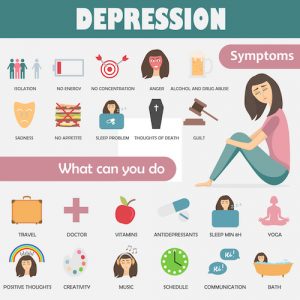Dealing With Depression
If you suffer from depression then you may feel that you can’t cope or go on. You may think that you have ‘done’ by this stage and that nothing will ever ‘get better’ for you. However, the good news is that if you are suffering from depression and are not being helped by your GP, you have options available to you. If your GP doesn’t believe that Cognitive Behavioural Therapy (CBT) is suitable for you, then you will have three other choices. You can self-treat using CBT exercises, attend regular support groups and use prescription drugs.
If you choose to treat yourself, there are some things that you can do. You might feel better quickly and see results if you follow a short exercise routine. This might include walking, jogging, cycling or swimming. These types of exercise are great for increasing the amount of oxygen circulating in your body which can make you feel better and help to reduce your general depressive mood. A few minutes each day can have a very positive impact on how you feel.
You might also want to consider using a set of’behavioural strategies’ to help deal with your depression. These strategies are designed to tackle the root causes of your problems and so work with your depression rather than just masking it. These strategies usually involve changing your view of things. For example, if you think that you are worthless then you are going to think that you are worthless. Changing your view to that you are valuable, will help you feel better.

How to Deal With Symptoms of Depression and Feelings of happiness
Another strategy that some people find helpful is hypnotherapy. This is a form of psychological therapy that involves listening to recorded CDs or tapes in your own home. The therapist will use a combination of talking to you and playing recorded hypnosis music. The music will help you to relax your mind as well as induce feelings of well-being. Many people find that this form of treatment helps to dramatically reduce their overall level of depressive mood. It can also help you keep your mood from worsening when you do get depressed.
https://www.insightsoflife.com/
If you find that your depression is particularly severe then you should consider seeing your doctor for a medical assessment. The doctor will be able to work with your doctor to create a treatment plan that suits your needs. Treatment will involve a range of methods to treating the different symptoms of your depression. You may receive a prescription for an anti-depressant medication to combat the physical symptoms such as fatigue, headaches and insomnia. You may also be advised that you should seek counselling in order to address the emotional aspects of your illness.
A mental health professional such as a psychiatrist, psychologist or registered nurse may need to be involved to properly evaluate your situation. Your GP or general practitioner may well be able to refer you to a psychiatrist or psychologist who can treat you without medical intervention. In some cases, the doctor and patient may decide that ongoing psychological treatment is more suitable than medication. When it comes to dealing with your depression and its symptoms there are no quick fixes. It is important that you work alongside your doctor in order to develop a long-term treatment plan that will take into account your feelings and behaviors. This way you can be sure to get the best care possible.